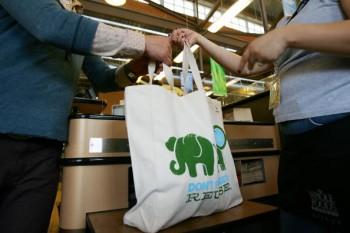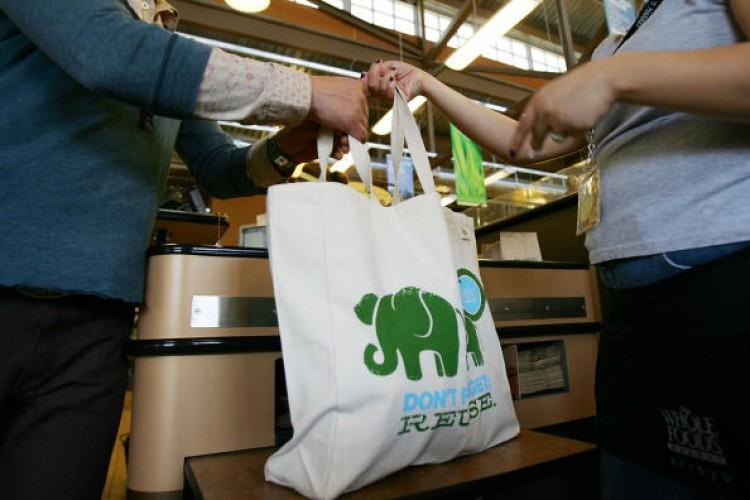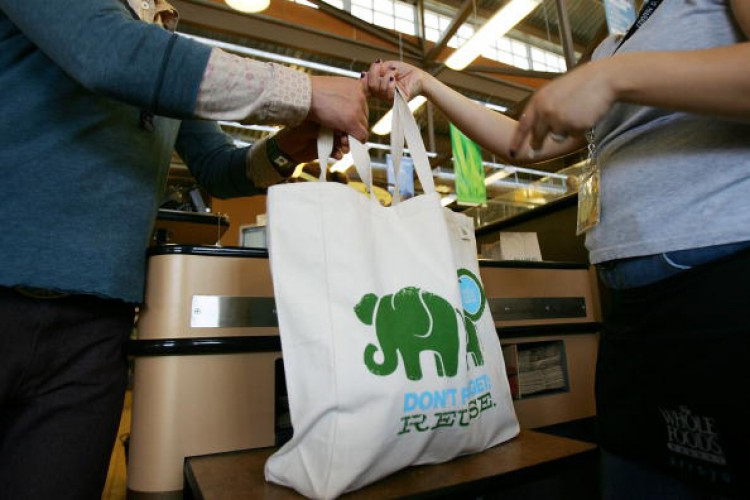Paper or plastic? The age-old grocery store question is being debated in Evanston, Ill., where residents are weighing in on a new bag decision: tax or ban?
A new law isn’t expected until later this year, but the Evanston City Council is in the process of rethinking the town’s distribution of single-use sacks. Some suggest taxing consumers for each bag they take, while others want to ban the bags altogether.
The reasons to support a bag ban are easy to spot (caught on a fence, clogging a grate, or fluttering in a tree) and too numerous to count. While various cities throughout the world have adopted a plastic bag ban over the last few years, Evanston stands to be the first city in Illinois to outlaw the option.
Cotton totes are a common sight in Evanston grocery stores, so I’m not surprised that this city would be pioneering this legislation. But in Evanston, and elsewhere, some want to protect the long held tradition of complimentary plastic bags with every in-store purchase. To do otherwise, they say, would violate our freedom of choice.
Now, I understand that freedom means different things to different people, and laws that risk our freedoms of expression, assembly, or other inalienable rights should be taken seriously. But, come on—freedom to be wasteful? Freedom to add to landfills, and floating trash islands? Freedom to poison wildlife? Do these rights really require protection?
I remember when I started carrying my own bags. It wasn’t my idea. My wife had seen an Earth Day Oprah episode recommending tips for greener living and insisted that we follow suit. As is often the case when I’m asked to change my routine, I complained. I argued that it would be a pain, waste of time, and awkward hassle to bring our own, and I also worried about how dorky I’d look.
But I was wrong. A few weeks into the new habit, I had to admit that it was a pretty good idea.
First, the cloth bags are easier to carry than either conventional option. They’re less likely to break so I can fill them up without having to rely on double bagging precautions. I can sling the handles over my shoulder leaving a free hand for holding keys and opening doors.
Plastic bag supporters say a bag ban could hurt sales because shoppers who forget to carry their own will buy less. They’re right. When I find myself without my own bags, I’m much less likely to buy things I don’t really need. But why is this bad? A law that discourages wasteful spending sounds like a fine idea.
While recycling plastic bags is a nice thought, according to a 2007 study just over 5 percent of our nation’s annual crop of 100 billion discarded specimens actually undergoes this process. Only a few recycling facilities can handle the job, and those that do make a lousy economic return. It costs $4,000 to process and recycle 1 ton of plastic bags, which are then sold for a mere $32, according to a 2007 report—hardly a sustainable business model.
Plus, the cloth bags also look better. Way better. Outside the store logo and keep-out-of-reach-of-children suffocation warning, plastic bags offer little style or personality. And their visual appeal only worsens with age—not a winning trait for an item that theoretically lasts forever.
A lot of stores now sell reusable bags to encourage the bring-your-own trend. A variety of designs to suit various tastes are available for purchase, but most of my bags didn’t cost a dime; several were promotional items, others were gifts. Some are over 20 years old. They still work great.
[email protected]







